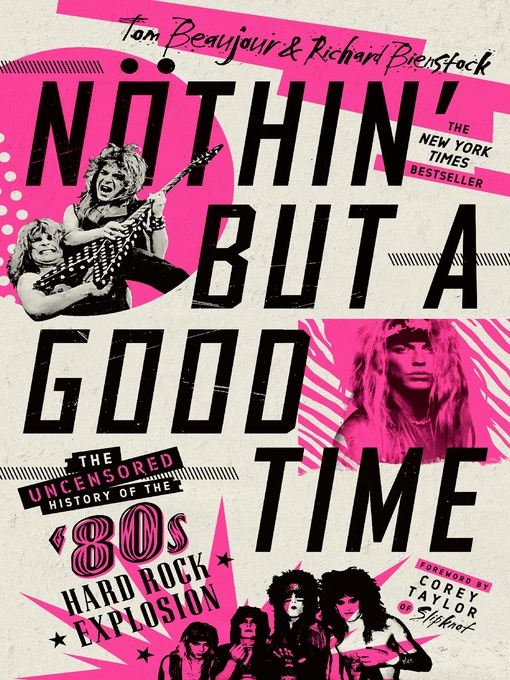
Nöthin' But a Good Time
The Uncensored History of the '80s Hard Rock Explosion
کتاب های مرتبط
- اطلاعات
- نقد و بررسی
- دیدگاه کاربران
نقد و بررسی

November 16, 2020
Revolver cofounder Beaujour and former Guitar World editor Bienstock (Kurt Cobain: Montage of Heck) give heavy metal a flamboyant retrospective in this raucous oral history. The pair interview dozens of figures from the glam-metal eruption of the 1980s, including Ozzy Osbourne and David Lee Roth; the members of Quiet Riot, Twisted Sister, Guns N’ Roses, Vixen, Winger, Ratt, and Poison; and sound engineers, record company execs, roadies, security guards, and costume designers (spandex pants, readers learn, became ubiquitous because they wouldn’t split at the crotch during acrobatic dance routines). Accounts of recording session tantrums, trashed hotel rooms, guitar-virtuoso rivalries, and the inter-band arms race toward ever-bigger hairdos and ever-crazier shows—“e started making the fire sign and the torture rack and the raw meat box,” recalls W.A.S.P. stage designer Al Bane—and pure debauchery (“I would wake up out of a binge and there’d be naked people and drugs everywhere,” Mötley Crüe bassist Nikki Sixx remembers. “I’d have blood all over my hands and my feet and not know what happened”) round out this irreverent and fun narrative. Metalheads and those with a fondness for the over-the-top antics that marked the genre and era are in for a treat.

February 1, 2021
Wilco's Jeff Tweedy famously observed in the song "Heavy Metal Drummer" that metal music fans seemed to be having a better time than anyone else. The genre's lyrical content--largely devoted to parties, drinking, and sex--bears that out. However, though stories of debauchery abound in this oral history by Revolver cofounder Beaujour and Bienstock (coauthor, Kurt Cobain: Montage of Heck), the book revolves mostly around the drive to make it big--constant touring and performing, mastering instruments, and honing songwriting skills. Artists such as Bret Michaels, Nikki Sixx, Don Dokken, and Sebastian Bach thoughtfully detail the inner workings of the music business, especially getting gigs and signing recording contracts. One entertaining chapter focuses on flyer distribution--a seemingly mundane task that was taken as seriously as rehearsing. Nevertheless, readers looking for sex, drugs, and rock and roll will be satisfied, too. The authors note that many accounts reflect outdated, sexist attitudes and emphasize that those "hoping for an outpouring of regret or a litany of mea culpas" will be disappointed; their objective was "to uncover what really happened from the people who lived it, not to make them apologize for it." VERDICT Rock music fans will be banging their heads to this book.--Brett Rohlwing, Milwaukee P.L.
Copyright 2021 Library Journal, LLC Used with permission.

February 1, 2021
Like disco before it and n�-metal after, the glam metal of the 1980s enjoyed a brief stint in the spotlight before being banished to the basements of embarrassed former fans. But time (and M�tley Cr�e's The Dirt) have occasioned a reappraisal of those old hairspray days. Beaujour and Bienstock compile quotes from all the big names of stateside hair metal, weaving the oral history into a comprehensive document of the rise and fall of the scene. Beginning with the early days of Quiet Riot and Van Halen, the book takes the reader through glam's ascent from L.A. clubs to arenas everywhere, spending equal time on Cr�e-style debauchery and the behind-the-scenes business that made these bands superstars, through the arrival of Nirvana, which turned the hair metal craze into poison overnight. The book's focus on the U.S., and Los Angeles in particular, means bands like Europe or scenes like Japan's visual kei pretty much go unmentioned. Still, it's hard to deny that this feels like the final word on the glam scene, much as Please Kill Me and American Hardcore were for their variants of punk. Existing fans will encounter names and stories they'd long forgotten, while novices might find a new appreciation for long-maligned hair bands like Cinderella.
COPYRIGHT(2021) Booklist, ALL RIGHTS RESERVED.

February 1, 2021
An oral history of the guitar-shredding rise and sleazy, druggy fall of 1980s hair metal. In this lively, comprehensive saga of the much-maligned genre, Beaujour and Bienstock deliver plenty of the sordid tales of sex and hard living that the music often celebrated--e.g., Motley Cr�e's orgies, a drug-addled Ozzy Osbourne snorting ants, Guns N' Roses in heroin-steeped disarray--while also showing how many of the musicians were hard workers dedicated to their craft. Guitarists playing the clubs on LA's Sunset Strip all aspired to Eddie Van Halen's greatness; acts engaged in full-scale "flyer wars" to get attention for their gigs; and they labored diligently on songs to land lucrative record deals. The hairspray and spandex, by the bands' lights, were just part of the necessary promotion and evidence of the effort they were putting in. "People are lazy [now]," says designer Al Bane, who outfitted a host of acts, lamenting the end of flashpots and assless chaps. The atmosphere was thick with casual misogyny toward disposable roadies and video models; Poison cynically pursued "ugly fat chicks" to attend shows as a point of differentiation. Throughout, the anecdotes are copious and irresistible: Great White singer Jack Russell's going to jail after a PCP bender, Axl Rose's chasing David Bowie out of a club for looking at his girlfriend the wrong way, Skid Row's Sebastian Bach's "inhaling beers" and getting into a drunken fistfight his first night with the band. Conventional wisdom dictates that Nirvana and grunge killed hair metal, but the musicians argue that oversaturation of bands was the real culprit. Regardless, the best-known acts now do brisk business on the nostalgia circuit. "The older fans are slightly larger now," says L.A. Guns' Tracii Guns, "so it makes the room look even fuller." An engrossing deep dive into a lurid, free-wheeling moment in pop music.
COPYRIGHT(2021) Kirkus Reviews, ALL RIGHTS RESERVED.

























دیدگاه کاربران